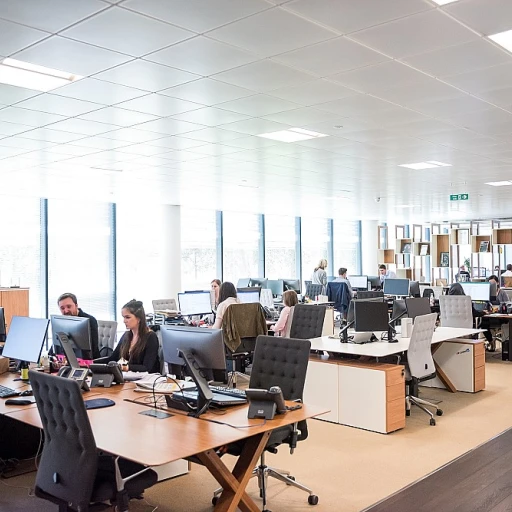
Understanding the Importance of Employee Qualities
The Role of Employee Qualities in Business Success
In today’s competitive business world, understanding the importance of employee qualities has become crucial for any organization aiming to sustain growth and success. Good employees are not just about ticking the boxes for job skills; they bring unique qualities that significantly contribute to the workplace dynamics and the company's overall success. Employee qualities such as adaptability, communication, problem-solving, and teamwork are critical in building a strong team that can turn challenges into opportunities for growth.
A great employee possesses the capability to adapt to change, stay focused on tasks, and continue delivering results, even when facing unexpected challenges. Companies that prioritize these qualities in their hiring processes often find themselves better positioned to thrive in changing environments. The qualities good employees exhibit are also integral in fostering a positive work environment that promotes collaboration, innovation, and success.
Communication skills are at the heart of these qualities, enabling effective collaboration and the sharing of ideas that lead to business innovation. Strong communication helps employees understand their roles within the team, align with the company’s mission, and develop a sense of belonging. This in turn propels the company culture forward, encouraging a work ethic that supports organizational goals and professional growth for the employees.
Moreover, placing emphasis on key qualities like emotional intelligence and soft skills during the hiring and evaluation processes can help identify those employees with leadership potential. Identifying and nurturing these qualities is essential for filling current and future leadership roles, ensuring a strong, cohesive team remains at the company's core.
By focusing on these qualities, organizations can effectively evaluate an employee’s potential to contribute positively to the company culture and their ability to integrate smoothly into the team environment. Learn more about how you can enhance employee evaluation to accurately assess and develop these qualities.
Adaptability: Thriving in a Changing Environment
Adapting in the Ever-Evolving Business Landscape
Adaptability is a critical trait that every company values in its employees. In today's fast-paced work environment, the ability to adjust to changing circumstances is not just a nice-to-have but a requirement for success. Employees who demonstrate adaptability can navigate new challenges, embrace change, and contribute significantly to the team's overall progress. Why is adaptability so important? Consider this: the business landscape is continually evolving, driven by technological advancements, economic shifts, and ever-changing consumer demands. Employees who can seamlessly transition between tasks, roles, and strategies are more likely to thrive in such a dynamic atmosphere. Moreover, adaptable employees often find it easier to acquire new skills, reflecting growth and resilience. By honing this quality, individuals not only become more valuable assets to the company but also ensure their professional development remains on a constant upward trajectory. For organizations aiming to cultivate a culture of adaptability, fostering an environment where employees feel safe to take calculated risks is key. Encouraging open dialogue and promoting emotional intelligence further enhances communication skills necessary for effective teamwork. It's about creating a supportive setting where exploring new approaches and proposing innovative solutions is celebrated. Investing in adaptability will lead to a versatile team ready to tackle any challenge that comes their way. For more insights on fostering adaptability in your team and enhancing employee performance, visit our detailed guide on enhancing employee performance with a mid-year evaluation framework.Communication Skills: The Backbone of Effective Collaboration
Connecting Words Effectively in the Workplace
Strong communication skills stand at the core of any successful business, playing a fundamental role in the success of individuals and teams alike. Sharing information and conveying clarity is crucial for maintaining a cohesive work environment. A good employee not only possesses the ability to express their ideas clearly but also demonstrates exceptional listening skills, an important employee quality that benefits everyone involved.
In a diverse workplace, emotional intelligence is instrumental in overcoming communication barriers. Employees with emotional intelligence are adept at recognizing the emotions of others, allowing them to tailor their approach to ensure effective interaction—key to fostering positive professional relationships.
Communication within a team is not only about delivering messages but also about listening attentively. A team player appreciates the value of listening, which helps identify potential areas for improvement or potential problems within a project. This kind of proactive attitude encourages critical thinking, allowing the team to navigate challenges and continuously work towards growth.
Companies benefit greatly from leaders who are adept communicators—those who can articulate visions, goals, and expectations with clarity. Such leaders not only guide their teams with precision but also inspire trust and motivation, proving that communication isn't just a skill but a leadership potential enhancer.
Moreover, within a company culture that emphasizes communication, issues are addressed more swiftly, productivity is bolstered, and employees feel more engaged. These are essential qualities of great employees, who understand the nuances of workplace interaction and contribute positively to their business environment.
Problem-Solving: Navigating Challenges with Confidence
Mastering Problems with Confidence
In today's dynamic work environment, possessing the ability to navigate challenges effectively is a hallmark of a great employee. The capability to solve problems creatively and efficiently is one of the key qualities that distinguishes good employees from their peers. The link between problem-solving and other traits like critical thinking and emotional intelligence is undeniable, as they all contribute to the decision-making process, allowing employees to address issues proactively. A workplace often requires employees to tackle unexpected hurdles, whether in their own tasks or when assisting their team. This fosters growth not just for the employee but for the company culture as a whole. Employees who excel in problem-solving are valued assets because they contribute significantly to the business, especially in fast-paced environments where time management and decisive action are crucial. To effectively fill gaps and meet the demands of challenging situations, employees must:- Analyze situations critically to identify core problems.
- Leverage communication skills to seek input and share solutions.
- Work collaboratively, showing strong work ethic and leadership potential.
- Be detail oriented to avoid overlooking important aspects of a situation.
Teamwork: Building a Cohesive Work Environment
The Synergy in Cooperation
Teamwork is an essential attribute that sets exceptional employees apart. In today’s dynamic work environments, the ability to effectively collaborate with others can significantly impact the success of a company. Employees with strong teamwork skills share insights, support each other’s ideas, and divide responsibilities, ensuring that projects are completed efficiently and effectively. Good employees understand the importance of emotional intelligence when engaging with colleagues. Emotional intelligence is key in fostering a positive work atmosphere, as it helps in understanding and managing one’s emotions while being empathetic to others'. This trait leads to enhanced communication skills and paves the way for a solid, collaborative work environment. A great employee is often also a team player who willingly contributes to the collective goals of the team. Team players demonstrate leadership potential as they manage conflicts with critical thinking and problem-solving skills, thus promoting harmony and productivity in the workplace. Such traits are deemed critical as they promote employee growth and development over time. The qualities good employees possess, such as adaptability, communication, and the ability to work well with others, reflect their commitment to the company’s objectives. By valuing teamwork and building a truly cohesive work environment, businesses ensure that everyone, from individuals to teams, is aligned with the organization's goals, leading to improved company culture and overall success. To cultivate teamwork as a core attribute, organizations can invest in team-building activities, promote an open line of communication, and establish a culture that encourages the sharing of ideas and feedback. This collective approach fosters a resilient workplace where employees are motivated to excel together and contribute positively to their business landscape.Work Ethic: The Foundation of Professional Success
Dedication and Dependability: The Bedrock of Professional Triumph
At the core of a thriving work culture lies a steadfast work ethic, which is a pivotal aspect of employee qualities that set great employees apart. This intrinsic quality not only shapes the trajectory of personal growth but it also bolsters the collective strength of a company. Within any work environment, an employee who demonstrates unwavering commitment and reliability becomes an invaluable asset, driving the business towards success.
Good employees exhibit an exceptional level of dedication to their responsibilities. Their consistent time management skills and attention to detail reflect a seriousness towards achieving both personal and company goals. The compulsion to meet deadlines, while maintaining a high standard of work, is a testament to their dependability.
In essence, a good work ethos promotes a culture where people share their best efforts, creating a domino effect of motivation within the team. Leaders recognize these employees as not just team players, but also potential leaders. The capacity to uphold strong ethics is often linked with leadership potential, as it embodies qualities good employees strive for in their day-to-day roles.
Moreover, a strong work ethic goes hand in hand with other key qualities such as adaptability and critical thinking. When challenges arise, a reliable employee is adept at utilizing their soft skills and problem-solving capabilities to overcome obstacles with confidence. In doing so, they not only fulfill their job requirements but also contribute positively to the wider company culture.
Ultimately, the essence of a robust work ethic lies in commitment—one that does not waiver in the face of challenges. It’s this quality that helps an employee stand the test of time, ensuring a successful and fulfilling career path.













